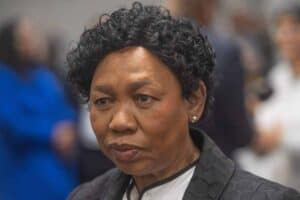Veterans of the youth struggle reflect on Mokgatle’s lifelong commitment to black consciousness and liberation.

Black consciousness movement stalwarts paid tribute to one of the 1976 Soweto students uprisings leaders, Barney Mokgatle, 73, who died recently without fanfare or publicity befitting of a leader who led one of the historic phases of the antiapartheid struggle.
The funeral was held at Bapong, the rural home of Mokgatle, on Sunday, after his death on 12 November.
Remembering the last of the Soweto trio
He was the last surviving leader of the Soweto trio who included Tsietsi Mashinini and Khotso Seathlolo.
Azanian People’s Organisation president Nelvis Qekema and General Hlomani Mabasa were among those who delivered eulogies.
Thabo Ndabeni, a 1976 stalwart, said Mokgatle played a critical role as part of the core leadership, which spearheaded the student uprising.
“At a particular point he had to also leave the country, to be with Mashinini.
“In exile, he was charged with the responsibility of driving the international campaign to raise awareness on the Soweto 11, who were charged with sedition and terrorism for leading the 1976 uprising.
“His dedication and commitment to the struggle to usher in a just and equitable society is unquestionable,” Ndabeni said.
Exile, training and revolutionary commitment
Mokgatle was among the first members of the SA Youth Revolutionary Council to receive military training, which he did in Lebanon and Syria in the Middle East.
Economic and development strategist Landiwe Mahlangu, a former black consciousness activist who expressed shock and sadness at Mokgatle’s death, said together with Sethlolo and Mashinini, Mokgatle led the student protests that shook the apartheid machinery to its core and reverberated around the world.
ALSO READ: Mokgatle continues the ’76 struggle
“June 16 was a defining moment for the struggle against apartheid and will forever be etched in history as the beginning of the end of apartheid.
“It also represented a revolutionary epoch, as students led the charge under the ideological orientation of black consciousness.
“The fact that at the time Barney and his comrades were merely high school students simply demonstrates the level of political and revolutionary maturity they have attained.
“Rooted in the philosophy of black consciousness, they were resolute in their quest for black power, unshaken in their belief of attaining an egalitarian and socialist society, fearless in their prosecution of the liberation struggle and undeterred by exile,” Mahlangu said.
Mokgatle’s unfinished mission
Mokgatle was passionate about education and before his death, he was on the verge of completing his memoir, which he wanted to be serialised and taught at schools, Mahlangu added.
Mokgatle died without fulfilling his mission to ensure that the 50th anniversary of the 16 June uprising next year would rekindle and reset the black people’s quest.
Black students still face challenges and endure academic disruptions, exclusions and lack of funding in the tertiary institutions, while their parents still face poverty, unemployment and marginalisation.
The land, the economy and power were still firmly in the hands of white capital – a situation enabled by the “captured and compradorial elite”, while the current government has been effectively seduced and assimilated into the neoliberal consensus, Mahlangu said.
“As black people collectively dip their banner and salute this son of the soil, they need to commit to completing his work.
“Mokgatle had unashamedly believed in the philosophy of black consciousness, was consistent in the building of the movement of Bantu Biko, Mapetla Mohapi, Poppie Buthelezi and many more,” said Mahlangu.
NOW READ: The history behind the iconic Youth Day photo






